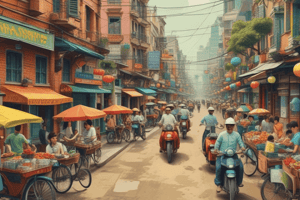Podcast
Questions and Answers
What is the nature of GST in terms of its imposition?
What is the nature of GST in terms of its imposition?
- It is imposed only at the point of origin
- It is imposed only on goods and not on services
- It is single-staged and only imposed at the final consumer level
- It is multi-staged and meant to be refunded to all parties in the production process (correct)
What is the main difference between GST and VAT?
What is the main difference between GST and VAT?
- GST is a digitalized form of VAT with the ability to track goods and services (correct)
- GST has different tax slabs compared to VAT
- GST has subsumed all indirect taxes, while VAT has not
- GST is only imposed at the point of consumption, unlike VAT
What are the tax slabs under GST for goods and services?
What are the tax slabs under GST for goods and services?
- 5%, 10%, 15%, 20%, and 25%
- 2%, 5%, 10%, 15%, and 20%
- 0%, 5%, 12%, 18%, and 28% (correct)
- 10%, 15%, 20%, and 25%
What items are not taxed under GST?
What items are not taxed under GST?
What happens to the taxation of petroleum products, alcoholic drinks, and electricity under GST?
What happens to the taxation of petroleum products, alcoholic drinks, and electricity under GST?
Flashcards are hidden until you start studying
Study Notes
GST Imposition
- GST (Goods and Services Tax) is a multi-stage, destination-based tax levied on the supply of goods and services.
- GST is imposed at every stage of the supply chain, with a mechanism of input tax credit (ITC) to avoid cascading of taxes.
GST vs VAT
- The main difference between GST and VAT (Value-Added Tax) is that GST is a comprehensive, multi-stage tax, whereas VAT is a single-stage tax.
- GST is a more comprehensive tax, covering a broader range of goods and services.
GST Tax Slabs
- GST has a four-tier tax structure for goods and services: 5%, 12%, 18%, and 28%.
- Certain essential goods, such as food grains, are exempt from GST.
Exempt Items
- Certain goods and services are exempt from GST, including:
- Agricultural produce
- Milk, curd, and lassi
- Fresh fruits and vegetables
- Bread, prasad, and puja samagri
- Unprocessed food items like coffee beans, tea leaves, and spices
Taxation of Specific Goods
- Petroleum products, such as petrol, diesel, and jet fuel, are outside the GST regime and continue to be taxed under existing laws.
- Alcoholic drinks and electricity are also outside the GST regime, and their taxation remains unchanged.
- States have the flexibility to levy taxes on these goods, as per their discretion.
Studying That Suits You
Use AI to generate personalized quizzes and flashcards to suit your learning preferences.




